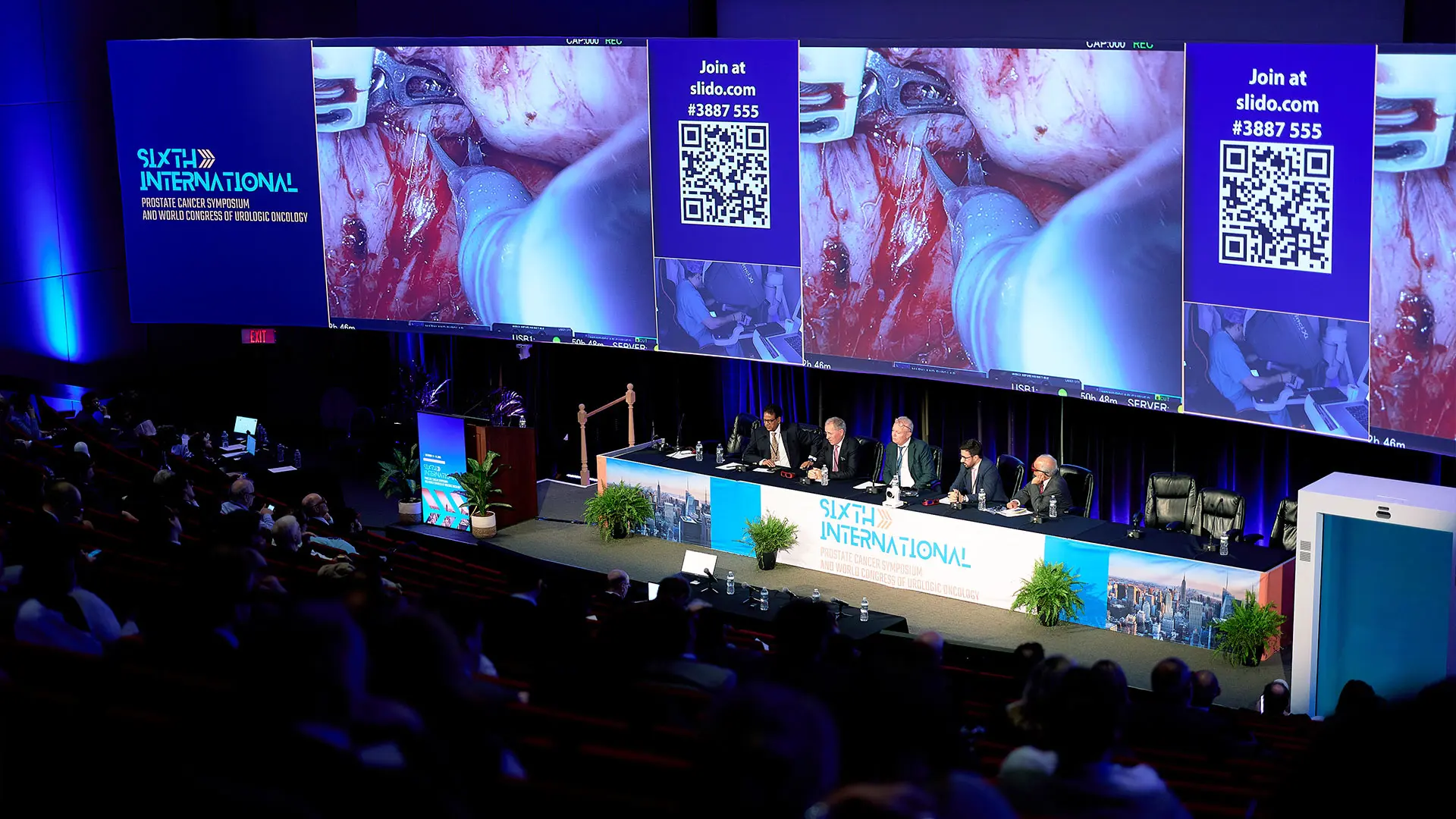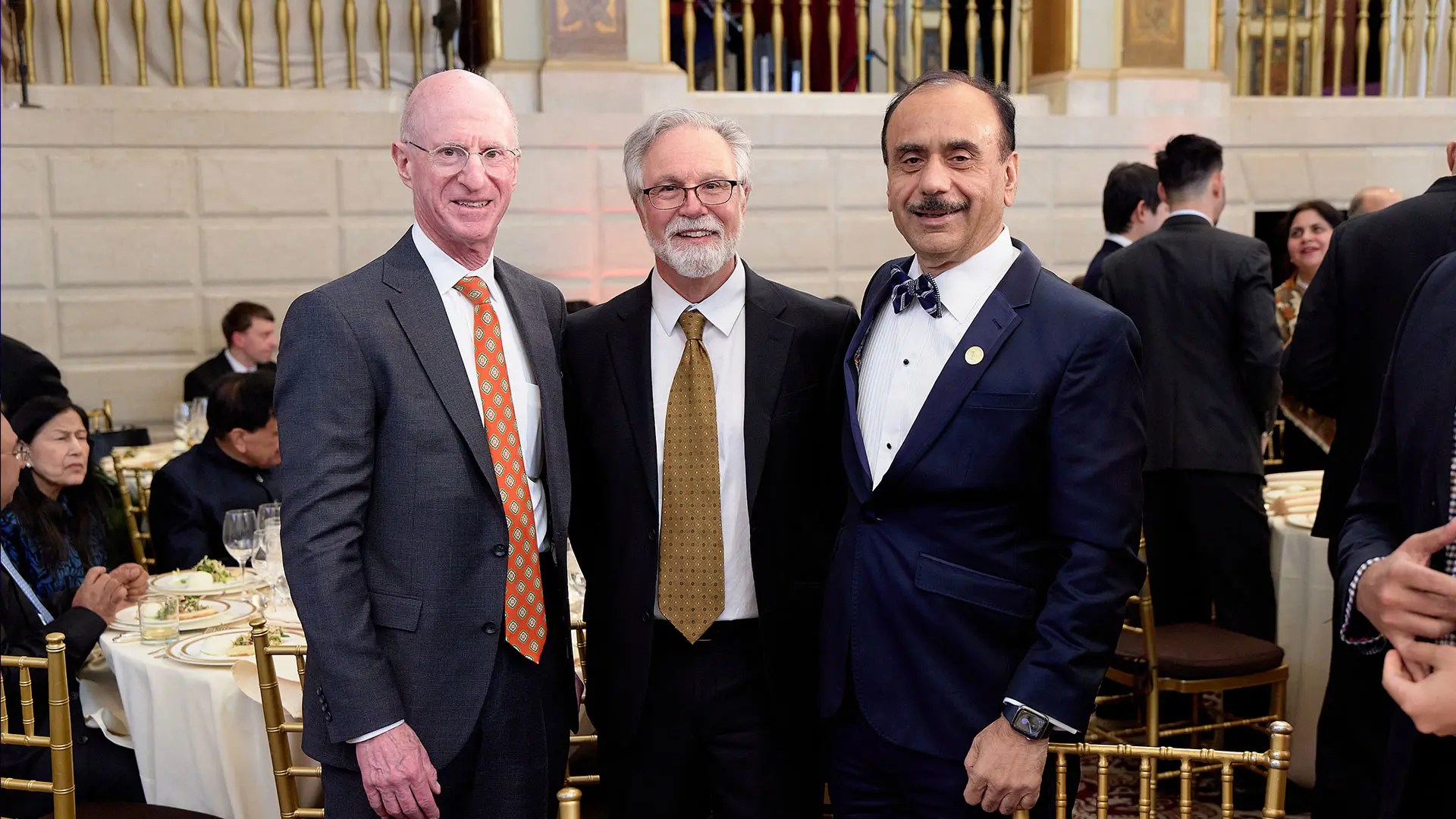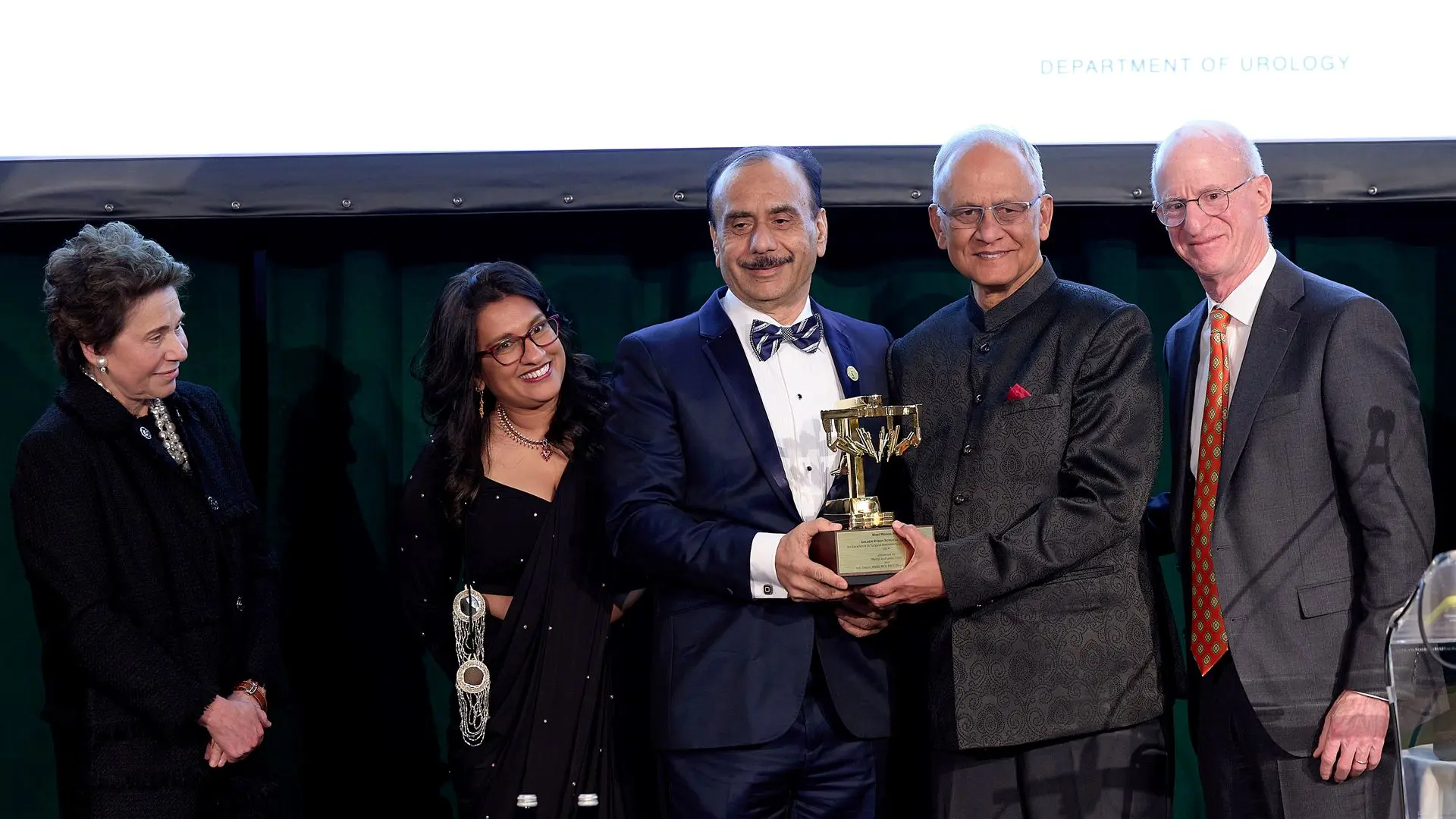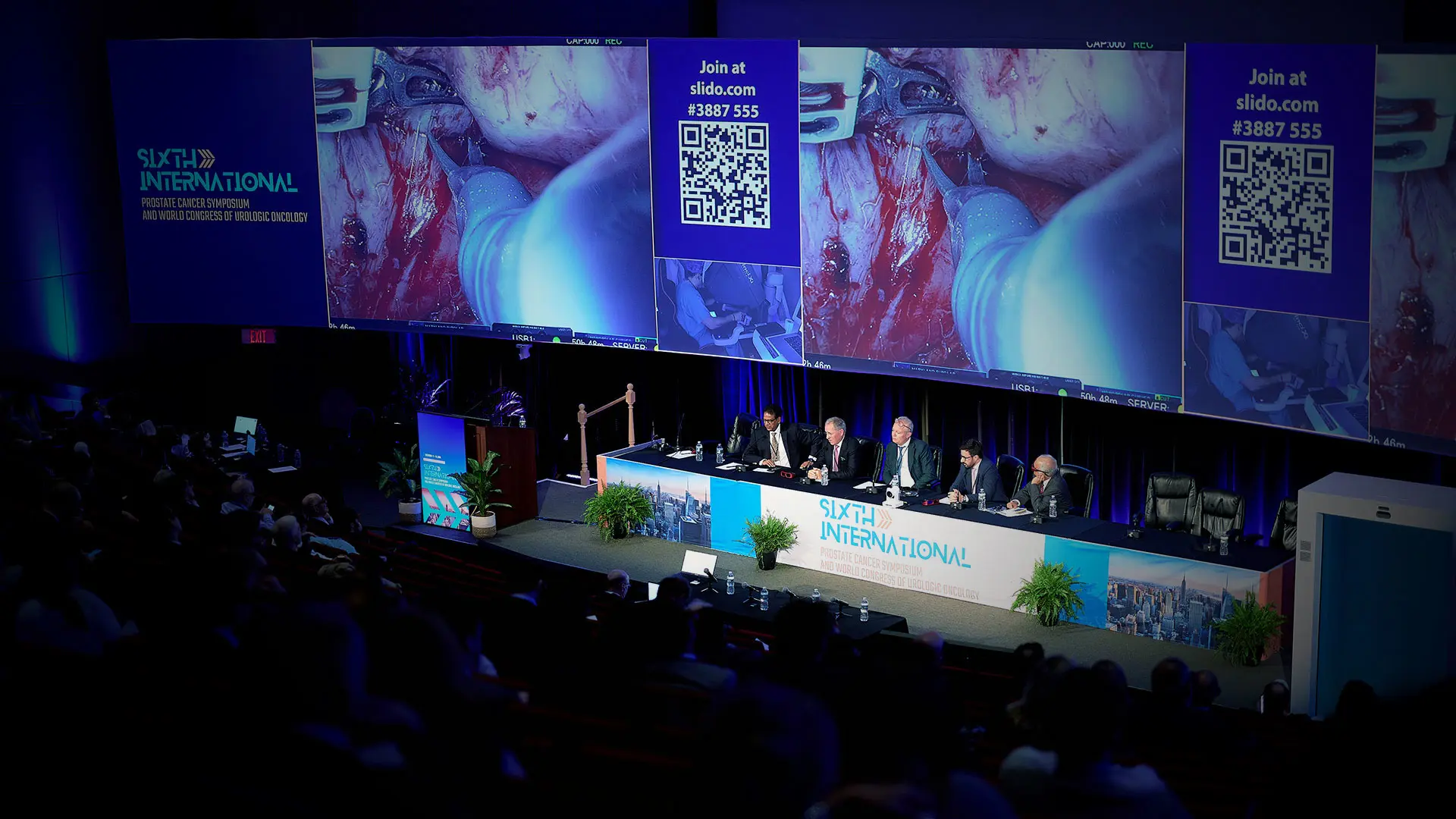The Sixth International Prostate Cancer and World Congress of Urologic Oncology attracted about 1,000 registrants and more than 800 attendees.
The Sixth International Prostate Cancer and World Congress of Urologic Oncology was filled with learning, collaboration, and intellectual synergy. The four-day event in December attracted about 1,000 registrants and more than 800 attendees, featuring more than 100 distinguished faculty members from around the globe and representing the pinnacle of modern urological care.
Hosted by the Icahn School of Medicine at Mount Sinai, the Congress opened with insightful talks by a number of renowned figures including Brendan Carr, MD, MA, MS, Chief Executive Officer and Professor and Kenneth L. Davis, MD, Distinguished Chair, Mount Sinai Health System; Nobel Laureate Gregg Semenza, MD, PhD, Professor of Genetic Medicine, Johns Hopkins University; and Dennis S. Charney, MD, Anne and Joel Ehrenkranz Dean of the Icahn School of Medicine at Mount Sinai and President for Academic Affairs, Mount Sinai Health System.

The Sixth International Prostate Cancer and World Congress of Urologic Oncology featured more than 100 distinguished faculty members from around the globe, representing the pinnacle of modern urological care. The 2025 congress is scheduled for December 3-6. Click here for more information.
This inaugural day also marked a significant milestone with the first session of dedicated semi-live surgeries, co-chaired by Vito Pansadoro, MD. Attendees could select from three channels of semi-live surgical procedures, narrated in real time by world-class urologists, creating an immersive and personalized educational experience.

A live demonstration performed by Ash Tewari, MBBS, MCh, FRCS (Hon.), Dsc (Hon.), captivated the audience, who were able to witness the technique’s intricate steps and its emphasis on precision and tissue preservation. The session underscored how advancements such as the HOOD technique are setting new standards in robotic prostatectomy, solidifying its position as a cornerstone of modern urologic surgery.
A highlight was a live demonstration of a nerve-sparing radical prostatectomy using hydro dissection. The demonstration was presented in 3D, and attendees equipped with active 3D glasses gained a surgeon’s perspective of robotic surgery. The day also featured the prestigious Royal College of Physicians and Surgeons of Glasgow North American Meeting, which included an opening address by Hany Eteiba, MBBCh, MSC, MD, President of the Royal College.
The second day featured an engaging keynote by Pulitzer Prize-winning author Siddhartha Mukherjee, MD, DPhil, author of The Emperor of All Maladies: A Biography of Cancer who spoke on the topic of “AI, Cancer, and Being a Digital Human.”
The second day also showcased an extraordinary blend of innovation and expertise, with one of the standout moments being the live demonstration of the HOOD technique for robotic-assisted radical prostatectomy, performed by Ash Tewari, MBBS, MCh, FRCS (Hon.), Dsc (Hon.). This technique, pioneered by Dr. Tewari, is designed to enhance surgical precision while preserving critical structures. Dr. Tewari is Professor and Chair, Milton and Carroll Petrie Department of Urology, Mount Sinai Health System; Chair of Urology, The Mount Sinai Hospital; Director of the Center of Excellence for Prostate Cancer at the Tisch Cancer Institute, Icahn School of Medicine at Mount Sinai; and Surgeon-in-Chief of the Tisch Cancer Hospital at The Mount Sinai Hospital.
This meticulous approach not only aids in achieving superior cancer control but also maximizes the preservation of erectile function and urinary continence—two crucial quality-of-life outcomes for prostate cancer patients.
Dr. Tewari’s live demonstration captivated the audience, who were able to witness the technique’s intricate steps and its emphasis on precision and tissue preservation. The session underscored how advancements such as the HOOD technique are setting new standards in robotic prostatectomy, solidifying its position as a cornerstone of modern urologic surgery.
David Reich, MD, President of The Mount Sinai Hospital and Mount Sinai Queens, addressed the gathering and revealed a preview of the Golden Robot Society pins, with one presented to Francesco Porpiglia, MD, for his contributions to the field. The details of this society and the significance of the pins were revealed on the last day of the series of events at the celebratory gala.
Other presentations included holographic lectures by Andrew Hung, MD, from California, and Prokar Dasgupta, OBE, FRCS, from London, who brought further innovation and global perspectives to the discussions. Together, these contributions made the second day an exceptional showcase of the latest advancements in prostate cancer care.

From left: James Tisch, Nobel Laureate Gregg Semenza, MD, PhD, and Dr. Tewari
The third day of the conference broadened the focus to kidney cancer, with a live surgery performed by Ketan Badani, MD, FRCS (Hon.), and a keynote presentation on groundbreaking advancements in kidney cancer treatment. Dr. Badani is Vice Chair of Urology and Robotic Operations and Director of the Comprehensive Kidney Cancer Center and Reconstructive Urology at the Mount Sinai Health System. Prostate cancer discussions also continued, including a talk by Stacy Loeb, MD, MSc, PhD (Hon.), on combating online misinformation about prostate cancer.
The conference showcased a wealth of basic science presentations, with luminaries in the field such as Mount Sinai’s Natasha Kyprianou, MBBS, PhD, leading panels that fostered collaboration and innovation. A two-day surgical skills workshop, co-hosted by Mount Sinai’s Department of Urology and ORSI Academy, was designed to enhance trainees’ surgical expertise and professional development. The course directors included Priyanka Dwivedi, PhD, and Nicola Frego, MD.
The final day turned the spotlight on bladder and testicular cancer. Semi-live surgeries by Mount Sinai’s Peter Wiklund, MD, PhD, were viewed in 3D, including a demonstration of retroperitoneal lymph node dissection (RPLND) for testicular cancer. The day also honored exceptional contributions, with Arnold Stenzl, MD, Secretary General of the European Association of Urology, receiving a Lifetime Achievement Award in Bladder Cancer Research. His keynote address, “Bladder Cancer 2030: Where Are We Going?” offered a forward-looking perspective on the field.
The congress concluded with a gala at The Plaza Hotel. The event celebrated the announcement of the 2024 Golden Robot Surgical Award for Excellence in Surgical Innovations for Cancer Patients, bestowed upon Mount Sinai’s Mani Menon, MD, a trailblazer in robotic surgery. The award was presented by Merryl and James Tisch and Dr. Tewari.

The 2024 Golden Robot Surgical Award for Excellence in Surgical Innovations for Cancer Patients, was bestowed upon Mount Sinai’s Mani Menon, MD, a trailblazer in robotic surgery. The award was presented by Merryl and James Tisch and Dr. Tewari.
This award was established in 2023 by Merryl and James Tisch to honor innovators in the field annually. The inaugural award was presented to Dr. Tewari.
The evening also introduced the Golden Robot Society, a global initiative honoring individuals who have significantly advanced robotic surgery. The pin ceremony honored and inducted to the society robotic surgeons from across the globe. This society will continue to grow as the committee promises to include more in its fold in future years .
With the 2025 congress scheduled for Wednesday, December 3, to Saturday, December 6, another exceptional meeting of minds in New York City is expected.
